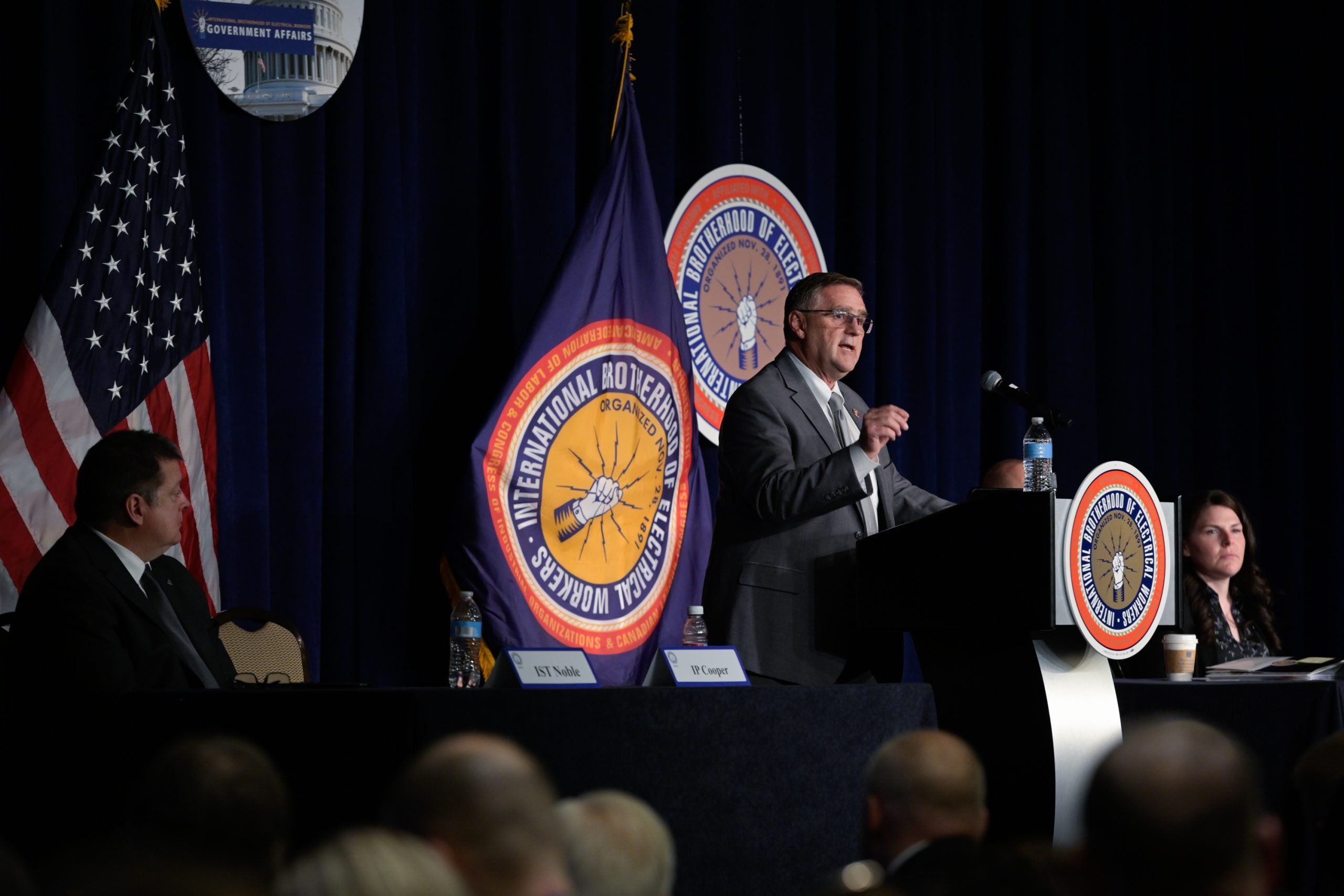On March 27, the Government Affairs department kicked off its first conference since 2019. IBEW power was the theme of the conference and how IBEW has capitalized on the strong relationships cultivated with the Biden administration over the last two years.
The speakers at the conference traced the arc of a powerful relationship that started before President Joe Biden entered the presidential campaign. IBEW leadership wanted to ensure that Biden would support IBEW jobs in any potential legislation.
“Joe Biden listened,” IBEW International President Kenneth Cooper said. “And he keeps listening every day. As a result, we are looking at full employment for electrical workers. For the first time in my career, we have work everywhere. Now it’s time to turn it up.”
Austin Keyser, the assistant to International President Cooper, started the conference by highlighting the IBEW’s heightened influence. “IBEW, as we sit here, we are one of the most powerful policy organizations in the United States.”
On March 28 at the Congressional Reception, more than 150 members of Congress turned out, including Senate Majority Leader Chuck Schumer (New York) and former House Speaker Nancy Pelosi of California, as well as the IBEW’s own Rep. Donald Norcross of New Jersey and Linda Sanchez of California.
Several Biden administration officials addressed the conference and described the IBEW’s continuing prominence inside the administration. The list includes the following:
- Mitch Landrieu, senior advisor to the president for infrastructure and implementation
- Ali Ziadi, assistant to the president and White House national climate advisor
- Erika Dinkel-Smith, White House director of labor engagement
What They Had to Say
“You have become part of the driving force behind President Biden’s agenda,” Dinkel-Smith said. “His agenda is to rebuild our energy grid, grow American manufacturing, and establish the greatest, most diverse, highest-skilled union workforce.”
Mitch Landrieu touted the 12.4 million jobs created in the United States during the Biden administration, including 800,000 new manufacturing jobs.
“Inflation is slowing, manufacturing is booming, and the economy is growing,” Landrieu said. “In the last 18 months, $200 billion has been awarded to 23,000 projects. So we are moving stuff out and getting it done.”
Landrieu said that electricians are one of the most common jobs created by the Bipartisan Infrastructure Law, the Inflation Reduction Act and the CHIPS and Science Act. Electrical tradesmen and women are needed to work on the vast federal investments in airports, transit, rail, broadband buildout, the power grid expansion and electric vehicle chargers.
IBEW Government Affairs Director Danielle Eckert led a workshop debuting the department’s new website at IBEWgov.org, the companion app and the IBEW Scorecard. The scorecard allows IBEW members to check the voting records of members of Congress. The website and app include blog posts reporting on recent IBEW and labor news and easy access to the IBEW’s 2023 policy brief.
Andy Snope, Minneapolis, Minn., Local 292 political director, said he appreciated coming to Washington, D.C. and meeting with Sen. Amy Klobuchar and Rep. Angie Craig. During their meetings, LU 292 discussed funding for a light rail line.
“In Minnesota, we have a legislature that fully supports labor, so we are working hard to get matching funds from the Inflation Reduction Act and the Bipartisan Infrastructure Law. We are also looking at extending the labor requirements that President Biden has put into regulations to receive those funds state-wide,” Snope said.
U.S. Rep. Ro Khanna of California made a case for an American manufacturing renaissance after losing its steel, paper, aluminum, semiconductor and auto parts production dominance over the past few decades to China. His economic patriotism philosophy calls for increasing domestic production, bringing jobs back from overseas, and promoting exports.
“We need to be a manufacturing superpower again,” Khanna said. “We need to make things in this country again.”
As always, Ohio Sen. Sherrod Brown echoed the call for a pro-worker, pro-America, pro-union industrial policy. He spoke of his long record of differences with presidents of both parties over trade agreements and lamented the corporate policies that rewarded layoffs and outsourcing by shareholders.
Today, with prevailing wages required by the Inflation Reduction Act and other new laws and policies, there are “good union jobs up and down the supply chain.”
“There is more momentum behind the labor movement than I have ever seen,” Brown said.

